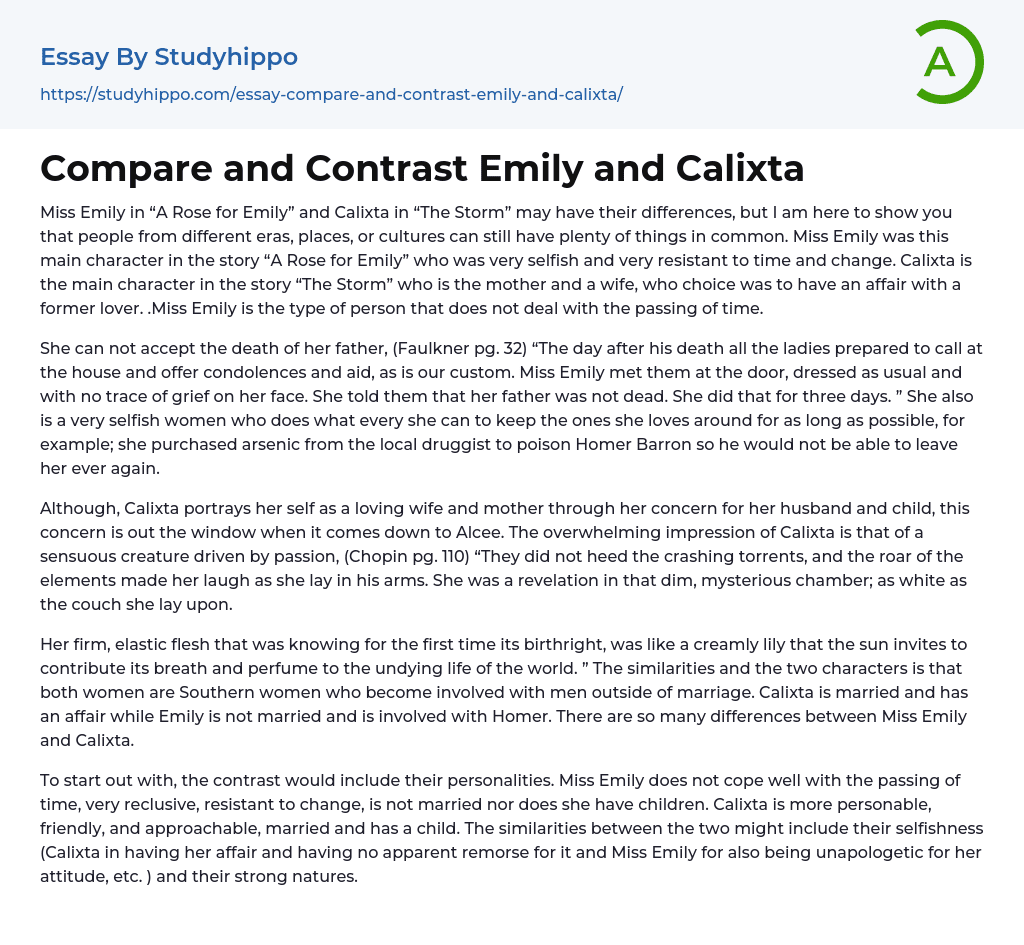She finds it impossible to come to terms with the death of her father, as shown in Faulkner (pg. 32) where it states, “The day following his demise, all the women decided to visit the home to present their cond
...olences and provide help, following traditional practice. When they arrived, Miss Emily greeted them at the entrance, attired per norm and her face devoid of any expressions of sorrow. She informed them her father was still alive. She repeated this for three successive days.” Additionally, she is an extremely self-centered woman who will go to any lengths to ensure that her loved ones stay by her side indefinitely. This is evidenced when she buys arsenic from a nearby pharmacist with the intent to poison Homer Barron, ensuring that he would never desert her.
Despite painting herself as a devoted wife and mother through her apparent care for her spouse and child, Calixta's attentiveness vanishes when it comes to Alcee. The prevailing image of Calixta is that of a passionate, sensual individual (Chopin pg. 110) who ignored th
thundering downpour and found amusement in the storm's roar while comfortably resting in his embrace. In the dim, mystical room, she appeared as a revelation and as white as the bed she reclined upon.
Her firm, resilient skin, experiencing for the first time its inherent right, resembled a creamy lily basking in the sun's invitation to share its fragrance and vitality with the ceaseless life of the world. The common aspect among the two women characters is that both hail from the South and engage in relationships with men outside wedlock. Calixta is a married woman who embarks on an affair, whereas Emily, an unmarried woman, gets involved with Homer. There are countless dissimilarities between Miss Emily and Calixta.
In the initial comparison, their personas play a crucial role. Miss Emily struggles with changing times, displaying reclusive behavior, resistance to change, and a life without a spouse or offspring. On the contrary, Calixta is sociable, amiable, and accessible, living a life that includes a husband and a child. Parallels between the two may lie in their self-centeredness (Calixta shows no evident regret over her extramarital affair, while Miss Emily remains unrepentant for her demeanor and so on) and their resilient temperaments.
- Book Summary essays
- Metaphor essays
- Reader essays
- Rhyme essays
- Literary devices essays
- Villain essays
- Books essays
- Genre essays
- Literary Criticism essays
- Writer essays
- Protagonist essays
- Simile essays
- Poem essays
- Book Report essays
- Book Review essays
- Greek Mythology essays
- Plot essays
- Tragic Hero essays
- Coming of Age essays
- Play essays
- Rhetoric essays
- Rhetorical Question essays
- Translation essays
- Understanding essays
- Reason essays
- Character essays
- Letter essays
- American Literature essays
- Literature Review essays
- Utopia essays
- Poetry Analysis essays
- Dante's Inferno essays
- Between The World and Me essays
- Incidents in The Life of a Slave Girl essays
- Flowers for Algernon essays
- Myth essays
- Everyday Use essays
- Boo Radley essays
- Genesis essays
- Richard iii essays
- Alice in Wonderland essays
- On the road essays
- Ozymandias essays
- The Nightingale essays
- Holden Caulfield essays
- Animal Farm essays
- 1984 essays
- A Hanging essays
- Shooting An Elephant essays
- A Tale Of Two Cities essays




